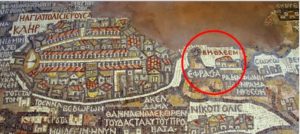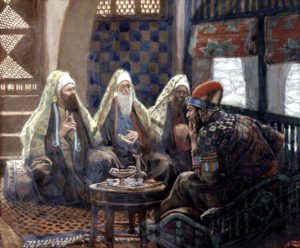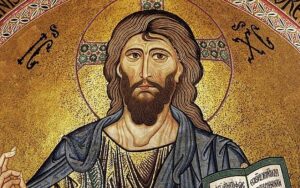There are a handful of passages that some point to in an effort to prove that Jesus preexisted as God in heaven. One of those verses appears in the book of Micah:
Micah 5:2 (NASB) “But as for you, Bethlehem Ephrathah, too little to be among the clans of Judah, from you One will go forth for Me to be ruler in Israel. His goings forth are from long ago, from the days of eternity.”
Jerusalem was going to muster troops to fight Assyria, but God took this opportunity to foretell that He would raise up someone from the tribe of Judah to rule on His behalf, that is, the Messiah. The prophecy says that the coming ruler’s goings forth are from long ago, from the days of eternity. This statement is interpreted by some to mean that Jesus existed from eternity. But is this a correct interpretation of Micah’s message?
His Goings Forth
The phrase goings forth is the Hebrew word motsaah. According to Strong’s Exhaustive Concordance, it means a family descent.[1] Motsaah is the plural form of motsa, which Strong’s says is a place or act of going forth, issue, export, source, spring.[2]
Some Bibles translate the phrase His goings forth as whose origins. But instead of supporting the preexistence of Christ, this translation undermines it because God, as an eternal being, cannot have an origin. Some may argue that the passage is referring to the origin of Jesus’ human nature and not his theorized God nature. If this is the case, according to the text, it would mean that Jesus’ human nature existed long ago, from the days of eternity, a statement that no Trinitarian would accept.
The context of Micah’s prophecy helps us determine the meaning of motsaah. The prophet announced that the one destined to rule would come from, or originate from the tribe of Judah, and the place of his going forth would be Bethlehem. There is no mention of heaven as the place from which the Messiah would come, rather only the small town in Judah.

Long Ago, Days of Eternity
It is the phrase days of eternity that captures the interest of those who want to prove Jesus preexisted. For them, it conjures up notions that Jesus has existed from eternity and is therefore God. However, the entire phrase is from long ago, from the days of eternity. This pairing of phrases is what is called a synonymous parallelism, which is a literary device that involves repeating a phrase using varying words.[3] Because the two phrases are “parallel” they will have the same meaning. Whatever long ago means, days of eternity, as its equivalent, must be translated to mean the same thing in this context. In Hebrew, qedem or long ago (or days of old as it is also translated) means temporal, ancient time, aforetime. Only two out of the eighty-seven times it is used in Scripture is it translated as eternal or everlasting. The only other time qedem is used in Micah (7:20), it is translated as days of old. Comparatively, the word eternity in Hebrew is olam, and it means of long duration, antiquity, futurity. It can refer to eternity, but it can also simply refer to an unspecified time in either the distant past or future. Since the NASB translators rendered qedem as long ago in this passage, olam should be translated as its equivalent. Thus, long duration or antiquity, and not the word eternity is a better translation. It is no wonder that numerous translators, given the context, reject the phrase days of eternity in favor of from ancient times and other similar phrasing:
English Standard Version
But you, O Bethlehem Ephrathah, who are too little to be among the clans of Judah, from you shall come forth for me one who is to be ruler in Israel, whose coming forth is from of old, from ancient days. (emphasis added)
New International Version
“But you, Bethlehem Ephrathah, though you are small among the clans of Judah, out of you will come for me one who will be ruler over Israel, whose origins are from of old, from ancient times.” (emphasis added)
Christian Standard Bible
Bethlehem Ephrathah, you are small among the clans of Judah; one will come from you to be ruler over Israel for me. His origin is from antiquity, from ancient times. (emphasis added)
Contemporary English Version
Bethlehem Ephrath, you are one of the smallest towns in the nation of Judah. But the LORD will choose one of your people to rule the nation–someone whose family goes back to ancient times. (emphasis added)
NET Bible
As for you, Bethlehem Ephrathah, seemingly insignificant among the clans of Judah–from you a king will emerge who will rule over Israel on my behalf, one whose origins are in the distant past. (emphasis added)
Young’s Literal Translation
And thou, Beth-Lehem Ephratah, Little to be among the chiefs of Judah! From thee to Me he cometh forth — to be ruler in Israel, And his comings forth are of old, from the days of antiquity. (emphasis added)
This rendering is much better suited to the context and the rest of Scripture that tells us that Jesus is a man instead of the one that aims to prove Jesus preexisted as God.
Scripture bears witness that the promise of the coming Messiah does indeed date back to long ago or to antiquity. Nine hundred years before Micah arrived on the scene, Jacob prophesied that a ruler from Judah would have an enduring kingdom.[5] Isaiah and Jeremiah also prophesied that the Messiah would come from the tribe of Judah.[6] But when the fullness of time came, as the apostle Paul would later write in a reference to Jesus’ birth in Bethlehem, “God sent forth His Son, born of a woman, born under the law.”[7] From where did God send the Messiah? From the town of Bethlehem. How long had it been known that God would send forth a king from the tribe of Judah? From days of old, from ancient times.

Micah and The Principle of Agency
There is additional textual evidence from Micah that explains who the Messiah is. We are told that the Bethlehemite would rule for God:
Micah 5:2 (NASB) [God speaking] “But as for you, Bethlehem Ephrathah,[8] too little to be among the clans of Judah, from you One will go forth for Me to be ruler in Israel. His goings forth are from long ago, from the days of eternity.” (emphasis added)
In other words, the Messiah would not rule on his own behalf, as would be expected if Jesus is God, but as the agent of God.
An agent is defined as one who has been “authorized to act for or in the place of another.”[9] In Hebraic terms, the agent or the “one sent” is called the shaliah.[10] The word comes from the verb shelach, which means to send. Professor and New Testament scholar James McGrath explains:
Agency was an important part of everyday life in the ancient world. Individuals such as prophets and angels mentioned in the Jewish Scriptures were thought of as ‘agents’ of God. And the key idea regarding agency in the ancient world appears to be summarized in the phrase from rabbinic literature so often quoted in these contexts: “The one sent is like the one who sent him.”[11] (emphasis added)
The principle of agency, also known as the law of agency, is an important concept that helps us better understand, not only Scripture as a whole but also who Jesus is, his ministry, and his relationship to God. Instead of being God, as orthodoxy claims, Jesus acts, speaks, and does the will of the God who sent him. Those in academia have long known about this principle. Unfortunately, some pastors and Bible teachers have either never heard of it or have neglected to teach it to their flock.
The Ruler is Not God
That Jesus is not God is further emphasized by the remainder of the prophecy’s context:
Micah 5:4 (NASB) And He will arise and shepherd His flock in the strength of the LORD, In the majesty of the name of the LORD His God. And they will remain, because at that time He will be great to the ends of the earth. (emphasis added)
Here the distinction between the prophesied ruler and God is made even more clear, for the coming king has a God. This truth in itself precludes Jesus from being God because God, as the supreme being, cannot have a God. Furthermore, we are told the Messiah will shepherd the flock, not in his own strength, as we would expect if Jesus is God, but in the strength and authority supplied by his God. Unfortunately, this portion of the text is overshadowed by the misinterpretation of verse 2.

Seven hundred years after Micah’s prophecy, the chief priests and scribes offered it in response to the magi’s question, “Where is he who has been born King of the Jews?”[12] They understood that a human king from the tribe of Judah would be born in Bethlehem and that God would equip him to rule on His behalf. They had no understanding that the would-be king preexisted as God, an idea that would not take full shape until the fourth century.
[1] Strong’s Exhaustive Concordance, https://biblehub.com/hebrew/4163.htm In 2 Kings 10:27, motsaah is also used to speak of a sewer or latrine, with the idea that it is the place from which refuse flows.
[2] motsa, #4161 and 4163, https://biblehub.com/hebrew/4161.htm
[3] Synonymous Parallelism in Hebrew Literature, Britannica.com, https://www.britannica.com/topic/synonymous-parallelism
[4] Matthew 1:1-25; Luke 3:21-38. See also Deuteronomy 18:15.
[5] Genesis 49:10.
[6] Isaiah 9:7; 16:5; Jeremiah 23:5-6; 33:15, etc.
[7] Galatians 4:4.
[8] Ephrathah is an ancient name for Bethlehem in Judah. It is used perhaps as a way to distinguish it from Bethlehem in Zebulun. (See in Judah: Genesis 35:16, 19; 48:7; Ruth 4:11, and 1 Samuel 17:12. In Zebulun: Joshua 19:15.)
[9] “agent,” Merriam Webster Dictionary, accessed 06-16-19, https://www.merriam-webster.com/dictionary/agent
[10] Also, shaliach, saliah, and salah.
[11] James F. McGrath, The Only True God: Early Christian Monotheism in its Jewish Context, (University of Illinois Press, 2009) p. 14.
[12] Matthew 2:1-12.




I am greatly impressed by your website contents – as these apparently are similiar to my recent line of thinking; these came out of a desire to try to learn about the true faith of the Early Christians & Nazarenes.
1. May I know which church/denomination do you represent?
2. Are there books/publications (in addition to the Bible) that you would recommend reading?
3. Also, do you have a congregation(s) in the Troy-Rochester Hills or northern Detroit suburbs in Michigan?
I look forward to your reply.
Thanks,
Kuruv’la Cherian
Greetings! Thank you for investigating the website and for your encouragement.
I am a Biblical Unitarian (not to be confused with Unitarian Universalists). I believe God the Father is the One True God, while Jesus His human Messiah/Christ. One denomination that holds similar views is the Church of God General Conference (of Abrahamic Faith). There is an organization called the Unitarian Christian Alliance that is made up of other Christian Unitarians. They have a map that designates where various groups, churches, individuals who hold unitarian views are located. It looks like there are some believers in the Detroit area.
You may also be interested in the UCA’s YouTube channel.
As for books, The God of Jesus in Light of Christian Dogma, by Kegan Chandler, is a very thorough and helpful treatment of the subject. It historically traces how the teaching of Scripture regarding Jesus and the God of the Bible deviated-evolved into today’s orthodoxy. I think you will find it very insightful and helpful.
Thank you for reaching out. God bless!
OGW